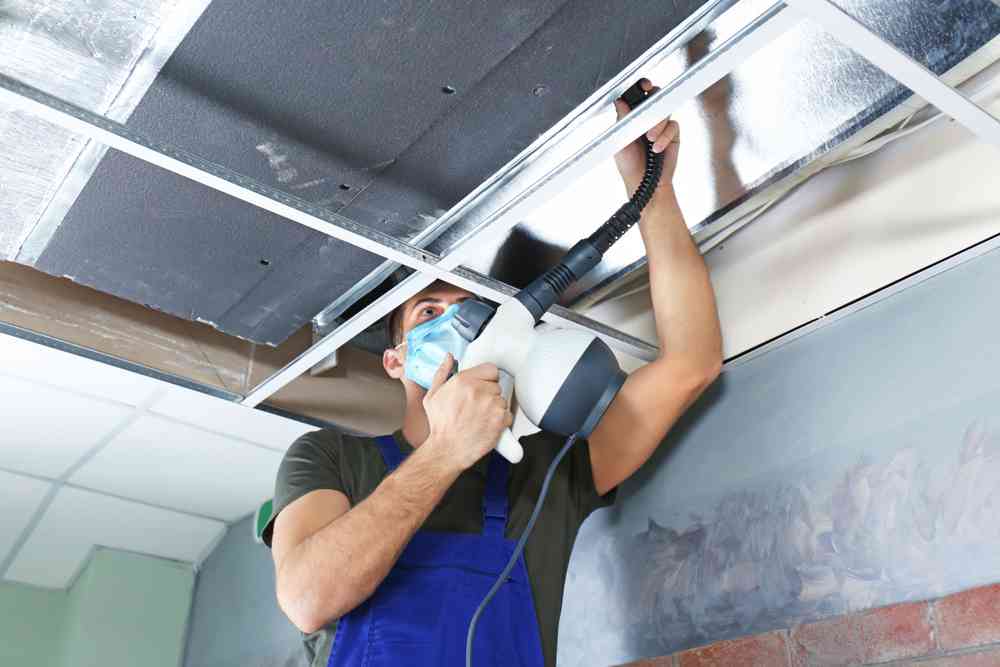The Consequences of Not Cleaning Kitchen Exhaust

Ontario-wide Kitchen Exhaust and Hood Cleaning – Best prices and service guaranteed.
Keeping a clean and well-maintained kitchen is essential for both the health and safety of those who use it. One often overlooked aspect of kitchen cleanliness is the regular cleaning of the kitchen exhaust system. Neglecting this important task can have serious consequences, ranging from health hazards to fire risks. In this article, we will explore the various consequences of not cleaning the kitchen exhaust system and highlight the importance of regular maintenance.
1. Increased Fire Risk
A dirty kitchen exhaust system can become a major fire hazard. Over time, grease and other flammable substances accumulate in the exhaust hood, ducts, and fans. When these substances are not regularly cleaned, they can ignite and cause a fire. According to the National Fire Protection Association (NFPA), cooking equipment was involved in almost half of all reported home fires between 2014 and 2018. Failure to clean the kitchen exhaust system was a contributing factor in many of these incidents.
Case Study: In 2017, a restaurant in New York City experienced a devastating fire that started in the kitchen exhaust system. The fire quickly spread throughout the building, causing extensive damage and resulting in the closure of the restaurant. The investigation revealed that the exhaust system had not been cleaned for several years, allowing grease to accumulate and ignite.
Ontario-wide Kitchen Exhaust and Hood Cleaning – Best prices and service guaranteed.
2. Poor Indoor Air Quality
A dirty kitchen exhaust system can lead to poor indoor air quality, which can have negative effects on the health of those in the vicinity. When the exhaust system is clogged with grease and other contaminants, it cannot effectively remove smoke, odors, and airborne particles from the kitchen. This can result in a buildup of pollutants in the air, leading to respiratory issues, allergies, and other health problems.
Statistics: According to the Environmental Protection Agency (EPA), indoor air pollution can be two to five times higher than outdoor air pollution. The accumulation of grease and other contaminants in the kitchen exhaust system contributes to this indoor air pollution.
3. Decreased Efficiency of Kitchen Equipment
A dirty kitchen exhaust system can significantly reduce the efficiency of kitchen equipment. When the exhaust hood and ducts are clogged with grease, the airflow is restricted, causing the equipment to work harder to remove smoke and heat from the kitchen. This increased workload can lead to higher energy consumption and premature wear and tear on the equipment.
Ontario-wide Kitchen Exhaust and Hood Cleaning – Best prices and service guaranteed.
Example: A study conducted by a commercial kitchen equipment manufacturer found that a dirty exhaust system can increase energy consumption by up to 20%. This not only results in higher utility bills but also shortens the lifespan of the equipment, leading to costly repairs or replacements.
4. Non-compliance with Health and Safety Regulations
Failure to clean the kitchen exhaust system can result in non-compliance with health and safety regulations. Many jurisdictions have specific guidelines and requirements for the regular cleaning and maintenance of kitchen exhaust systems. Non-compliance can lead to fines, penalties, and even closure of the establishment.
Example: In 2019, a restaurant in California was fined $10,000 for failing to clean their kitchen exhaust system as required by local health and safety regulations. The restaurant was also temporarily closed until the system was properly cleaned and brought into compliance.
Ontario-wide Kitchen Exhaust and Hood Cleaning – Best prices and service guaranteed.
5. Unpleasant Odors and Grease Buildup
A neglected kitchen exhaust system can result in unpleasant odors and grease buildup in the kitchen. When the system is not cleaned regularly, the accumulated grease and food particles can emit foul smells, making the kitchen an unpleasant environment for both staff and customers. Additionally, the grease buildup can attract pests such as cockroaches and rodents, further compromising the cleanliness and hygiene of the kitchen.
Case Study: A fast-food chain experienced a significant decrease in customer satisfaction due to persistent odors in its kitchen. After investigating the issue, it was discovered that the kitchen exhaust system had not been cleaned for an extended period. Once the system was thoroughly cleaned, the odors disappeared, and customer satisfaction improved.
Ontario-wide Kitchen Exhaust and Hood Cleaning – Best prices and service guaranteed.
Regular cleaning and maintenance of the kitchen exhaust system are crucial for maintaining a safe and healthy kitchen environment. The consequences of neglecting this task can be severe, ranging from increased fire risk to poor indoor air quality and decreased equipment efficiency. Non-compliance with health and safety regulations can also result in fines and the closure of the establishment. By prioritizing the cleaning of the kitchen exhaust system, individuals and businesses can ensure the well-being of their staff, customers, and the overall longevity of their kitchen equipment.
Learn more about “The Benefits of Maintaining Kitchen Exhaust Cleaning“
Frequently asked questions about The Consequences of Not Cleaning Kitchen Exhaust

What are the primary risks associated with not cleaning kitchen exhaust systems? 🚫🧽
Failing to clean kitchen exhaust systems can lead to several serious risks! 😟
Fire Hazards 🔥: Grease and residues that accumulate in the exhaust system can ignite, leading to dangerous fires.
Health Concerns 🤧: Poor ventilation due to a clogged exhaust can lead to the build-up of harmful pollutants, potentially affecting the health of staff and patrons.
Reduced Equipment Lifespan ⏳: Without regular cleaning, your exhaust system can wear out more rapidly, requiring premature replacements or costly repairs.
Failed Inspections 📝: Health and safety inspectors look for clean and well-maintained kitchen environments. A dirty exhaust system can result in violations and penalties.
Can a dirty kitchen exhaust impact the taste and quality of food? 🍔
Absolutely! When your kitchen exhaust is clogged or unclean, it doesn’t effectively remove smoke, steam, and odors 🌫️. As a result, these can linger in the kitchen, potentially affecting the taste and aroma of dishes. The flavors of previously cooked foods might mix with new ones, compromising the authenticity of each dish’s flavor profile. In short, a dirty exhaust can overshadow your culinary efforts, leading to inconsistent and subpar dishes. 😓🍲
How can not cleaning the kitchen exhaust affect energy efficiency and bills? 💡💰
A well-functioning kitchen exhaust system is pivotal for optimal airflow and ventilation. When it’s clogged with grease and debris, the system has to work harder to expel air, leading to higher energy consumption ⚡. This not only strains the exhaust system but can also lead to increased utility bills. In essence, neglecting regular exhaust cleanings might end up costing you more energy expenses in the long run. 💸📈
Can an unclean kitchen exhaust lead to a negative customer experience? 😕
Definitely! A kitchen with poor ventilation due to a dirty exhaust can lead to smoke, odors, and even pollutants escaping into the dining area. This can create an unpleasant environment for your customers 🤭. Imagine dining in a smoky setting or your clothes absorbing strong kitchen odors – not the most delightful dining experience! Plus, visible dirt or the perception of an unkempt environment can raise hygiene concerns, potentially deterring customers from returning. 🍽️❌
How often should I clean my kitchen exhaust to avoid these consequences? 📅
The frequency of exhaust cleanings can vary based on how heavily your kitchen is used. For extremely busy kitchens, monthly cleanings might be appropriate. For others, quarterly or semi-annual cleanings might suffice. It’s essential to consult industry standards and guidelines 📘, and perhaps even consider getting a professional’s opinion.
Regular inspections can also help determine the ideal cleaning frequency for your specific needs. Staying proactive with maintenance is the best way to avoid the mentioned consequences! ✅🧼
- hood cleaning
- kitchen exhaust cleaning
- restaurant hood cleaning
- The Consequences of Not Cleaning Kitchen Exhaust






